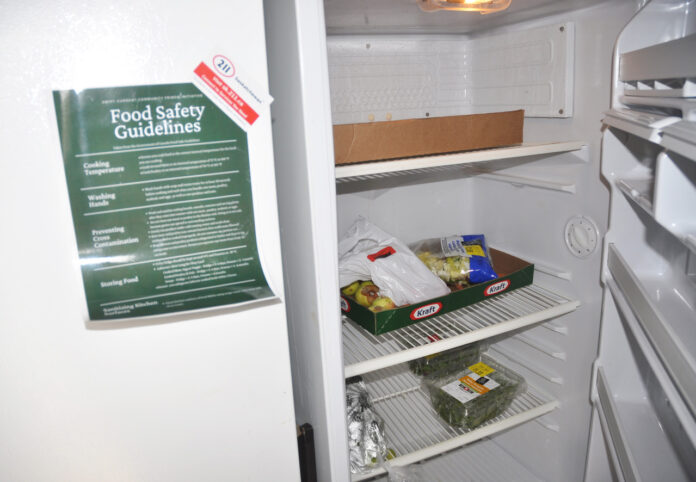By Matthew Liebenberg
A new initiative in Swift Current has created a community fridge to assist individuals experiencing food insecurity.
Food items donated by community members are available 24 hours a day at the community fridge location in downtown Swift Current.
A small shed, which contains a fridge, freezer and shelves, is used for this purpose. It is situated in the Innovation Credit Union parking lot on the corner of 2nd Avenue NE and Cheadle Street East, across the street from Great Plains College.
Swift Current residents Keelan Cornelson and Lindsey Wilk started the initiative in mid-June and community support made it possible to have everything in place and to have food available since Aug. 17.
“A community fridge goes on the basis of take what you need, give when you can,” Wilk said. “It relies on community donations and support to maintain functionality. The hope is that volunteers will continue to bring donations. Community businesses can help as well.”
A key feature of a community fridge is that there are no restrictions on access. The shed is never locked and anyone can take food at any time during every day of the week.
“We try to put it in an accessible location that’s pretty central for all areas of the city for ease of access and close to bus stops,” she said. “So if people use the bus transit system, it’s close by to them.”
The intention of a community fridge is not to replace other services in the community such as a food bank, but it provides another option for anyone who is facing food insecurity.
The more informal nature of a community fridge can be a benefit to individuals who need food, but who might not be connected to or registered with other available services in the community.
Cornelson noted that there is also the issue of shame and stigma associated with food insecurity that might make individuals hesitant to use a more formalized community service such as a food bank.
“There’s so much stigma and people are hesitant to go there, not because it’s not a welcoming place, but because of the shame associated with the struggle,” she said.
A community fridge can therefore provide a place where someone can feel comfortable to go when they need food items.
“We don’t want to induce feelings of shame or take away people’s autonomy, because food insecurity is becoming more of an issue,” Wilk said. “Unfortunately, we live in a culture that creates shame and embarrassment around that.”
To avoid any feelings of hesitancy about going to the community fridge when someone needs food, the issue of monitoring of the site must be approached in a sensitive manner.
“That really takes away building mutual trust with people who use the fridge,” Wilk said. “The goal is that we build mutual respect between everybody in the community and everybody treat this like part of ownership. It’s truly everybody’s resource and it’s not to be policed.”
Cornelson added that the intention is to make the community fridge an equitable space or service that truly serves the needs of people.
“It has to be cognizant of the fact that it is up to people to use that resource as they see fit and not in any way, shape or form any other person’s version of how you should use the fridge,” she said.
Community fridges can be found in cities across Canada as well as in other countries. There are such fridges in several Saskatchewan communities, including Saskatoon and Regina. A community fridge is set to open soon in Yorkton.
Cornelson and Wilk spoke to individuals involved with community fridges in Regina and Saskatoon when they begin talking about one in Swift Current. They have personally seen the impact of food insecurity on individuals, because Cornelson is a social worker and Wilk is a community health nurse.
“We just started having a conversation about how it was frustrating to us that people weren’t having their needs met and not being able to eat,” Cornelson said. “And we were like, let’s do something about this, and then we figured why couldn’t we make a community fridge.”
They began the Facebook group Swift Current Community Fridge Initiative on June 15 in an effort to get the word out. Soon afterwards they began to get responses and offers of help and support. Donations of a shed, fridge, freezer and a variety of other items and materials made a real difference to the initiative. A lot of helping hands assisted with various details along the way.
“It has been absolutely amazing to see the community of Swift Current come together and just really be involved in any and all aspects of this and be supportive among one another,” Wilk said. “It’s truly been just amazing to see the kindness within our community.”
The Facebook group continues to be a useful resource to share information about the initiative. There are specific guidelines, based on food safety criteria, for donations of foods.
Acceptable items are fresh fruits and vegetables, dried foods with a stable shelf life, non-alcoholic drinks, jarred and canned foods that are sealed and unopened. Breads and pastries, eggs and dairy and meat products must be store purchased with a clear best before date.
Ready-made meals can be donated on condition that it was prepared in a food-safe certified kitchen. It must be clearly labelled with the meal description, ingredients and food origin.
Unacceptable items are food past the best before and expiry date, food leftovers, moldy food, dented cans, food prepared in an unregistered home or kitchen, food with damaged or open packaging, recalled food, alcohol and high-risk food such as raw meat, seafood, cooked rice and bean sprouts.
Ongoing community support will be necessary to sustain the community fridge. People are encouraged to take their food donations to the shed and place it inside. They can also sign up to volunteer with the cleaning team, fridge and pantry stocking team as well as the maintenance crew.
Cornelson referred to other ways to get involved. Sharing information about the initiative and creating awareness about it will be helpful. Support can be something as basic as being part of the discussion.
“So commenting on a Facebook page, posting questions, sharing feedback about the project or sharing what you donated,” she said. “Another thing is notifications. So to make a post about when the fridge is requiring a re-stock or what items are well liked by the people using the fridge. All those things are really important. It promotes other people’s awareness that this is an issue.”






